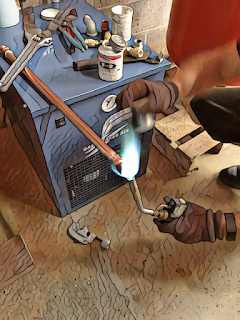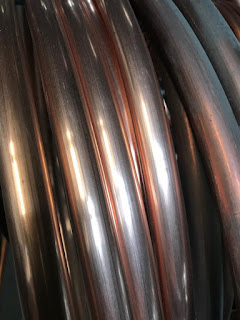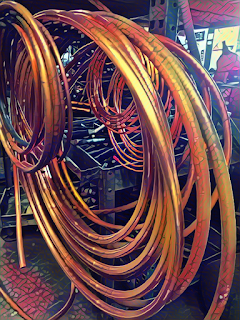AIR COMPRESSOR LINES
AIR COMPRESSOR LINE INSTALL
AIR COMPRESSOR AIR LINE INSTALLATION AND REPAIRS. CALL US FOR A FREE QUOTE ON FIXING/ REPLACING OR INSTALLING NEW AIR LINES IN YOUR BUILDING.
AIR COMPRESSOR AIR LINE INSTALLATION AND REPAIRS. CALL US FOR A FREE QUOTE ON FIXING/ REPLACING OR INSTALLING NEW AIR LINES IN YOUR BUILDING.
214-428-2868
How to know what size piping your Compressed Air System needs.
| EQUIVALENT LENGTH OF PIPE LINES IN FEET | ||||||||
| Your Air | REMEMBER: include *PIPE FITTINGS in your final calculations | |||||||
| Compressor’s | ||||||||
| C.F.M | 25 | 50 | 75 | 100 | 150 | 200 | 250 | 300 |
| feet | feet | feet | feet | feet | feet | feet | feet | |
| 1 | ½ | ½ | ½ | ½ | ½ | ½ | ½ | ½ |
| 2 | ½ | ½ | ½ | ½ | ½ | ½ | ½ | ½ |
| 3 | ½ | ½ | ½ | ½ | ½ | ½ | ½ | ½ |
| 5 | ½ | ½ | ½ | ½ | ½ | ½ | ½ | ½ |
| 10 | ½ | ½ | ½ | ¾ | ¾ | ¾ | ¾ | ¾ |
| 15 | ½ | ¾ | ¾ | ¾ | ¾ | ¾ | ¾ | ¾ |
| 20 | ¾ | ¾ | ¾ | ¾ | ¾ | ¾ | ¾ | ¾ |
| 25 | ¾ | ¾ | ¾ | ¾ | ¾ | 1 | 1 | 1 |
| 30 | ¾ | ¾ | ¾ | ¾ | 1 | 1 | 1 | 1 |
| 35 | ¾ | ¾ | 1 | 1 | 1 | 1 | 1 | 1 |
| 40 | ¾ | 1 | 1 | 1 | 1 | 1 | 1 | 1 |
| 50 | 1 | 1 | 1 | 1 | 1 | 1 | 1 | 1 |
| 60 | 1 | 1 | 1 | 1 | 1-1/4 | 1-1/4 | 1-1/4 | 1-1/4 |
| 70 | 1 | 1 | 1 | 1 | 1-1/4 | 1-1/4 | 1-1/4 | 1-1/4 |
| 80 | 1-1/4 | 1-1/4 | 1-1/4 | 1-1/4 | 1-1/2 | 1-1/2 | 1-1/2 | 1-1/2 |
| 100 | 1-1/4 | 1-1/4 | 1-1/4 | 1-1/4 | 1-1/2 | 1-1/2 | 1-1/2 | 1-1/2 |
| 125 | 1-1/4 | 1-1/4 | 1-1/4 | 1-1/4 | 1-1/2 | 1-1/2 | 1-1/2 | 1-1/2 |
| 150 | 1-1/4 | 1-1/4 | 1-1/4 | 1-1/4 | 1-1/2 | 1-1/2 | 1-1/2 | 1-1/2 |
| 175 | 1-1/2 | 1-1/2 | 1-1/2 | 1-1/2 | 2 | 2 | 2 | 2 |
| 200 | 1-1/2 | 1-1/2 | 1-1/2 | 1-1/2 | 2 | 2 | 2 | 2 |
| 225 | 1-1/2 | 1-1/2 | 1-1/2 | 1-1/2 | 2 | 2 | 2 | 2 |
| 250 | 2 | 2 | 2 | 2 | 2 | 2 | 2 | 2 |
| 275 | 2 | 2 | 2 | 2 | 2 | 2 | 2-1/2 | 2-1/2 |
| 300 | 2 | 2 | 2 | 2 | 2 | 2 | 2-1/2 | 2-1/2 |
| 350 | 2 | 2 | 2 | 2 | 2-1/2 | 2-1/2 | 2-1/2 | 2-1/2 |
| 400 | 2 | 2 | 2 | 2 | 2-1/2 | 2-1/2 | 2-1/2 | 2-1/2 |
| 450 | 2-1/2 | 2-1/2 | 2-1/2 | 2-1/2 | 2-1/2 | 2-1/2 | 3 | 3 |
| 500 | 2-1/2 | 2-1/2 | 2-1/2 | 2-1/2 | 2-1/2 | 2-1/2 | 3 | 3 |
| 550 | 2-1/2 | 2-1/2 | 2-1/2 | 2-1/2 | 3 | 3 | 3 | 3 |
| 600 | 2-1/2 | 2-1/2 | 2-1/2 | 2-1/2 | 3 | 3 | 3 | 3 |
| 750 | 2-1/2 | 2-1/2 | 2-1/2 | 3 | 3 | 3 | 3 | 4 |
| 1000 | 3 | 3 | 3 | 3 | 3 | 3 | 4 | 4 |
What Are the Best Materials for
Compressed Air Piping?
·
Iron. Black iron piping has been around for decades. ...
·
Copper. Copper piping is an excellent choice for use with air
compressors. And think about it, if you
want to sell your building in 10-20 years; the copper won’t lose its value!!
·
Stainless Steel. Stainless steel is strong and resists corrosion.
...
·
Aluminum. ... A lot of businesses are going with the blue aluminum
because it is somewhat cheaper than cooper and quicker to install.
Figuring the correct pipe size for your compressed air distribution system is crucial to the overall performance. Pipe that is sized too small can create big pressure losses and reduce operating efficiency.
REMEMBER:
TOO BIG IS JUST AS BAD AS TOO SMALL.
FITTINGS: Every pipe fitting creates a certain amount of increased frictional air loss that is equal to a specified length of pipe. Any turns in the pipe at fittings, elbows, tees, and valves increase pressure drops even more.
FUTURE: If you are planning on expansion or adding new equipment in the near future, then plan for larger piping now. Remember that an oversize pipe compensates for possible scale build-up and provides for future expansion of the overall air system.
These 3 factors can have a more significant impact
on your pressure efficiency than leaks:
1. Sharp angles
2. Moisture
3. Obstructions and Blockage
WHY SHARP ANGLES ARE BAD:
Sharp
angles in your piping system impede the speed of flow, reducing pressure. If you
have to make a sharp turn, you have to slow down, similar to a train. It typically slows way down coming into a
sharp turn in the tracks. Coming out of
any bend in the track requires correcting
any overcompensation for the turn and account for any unexpected objects
on the track such as debris; stray animals, stuck cars, etc.
Any bend
in the piping system can send the air ricocheting off the inside of the
pipe.
Laminar: When
air bounces off course and wastes energy.
Turbulent: A convoluted air flow path.
WHY IS MOISTURE BAD:
Water will corrode certain types of pipe, (especially black iron
pipe) It will cause serious rust to flake off into the air stream. That rust,
along with vapor, will arrive at the end-use equipment, clogging nozzles and
contaminating the material you intend for the compressed air to deliver or
apply.
Moisture
is an unavoidable byproduct of air compression. The water that emerges from
compression originates in the air taken in by the compressor. When you compress
air, it is HOT…HOT…HOT…..When that air is compressed, the water in it condenses from its
vapor form into a liquid state.
SOLUTIONS TO LESSEN MOISTURE:
1. AFTERCOOLERS
2. DRYERS
3. DRIP LEGS
4. COALESCENT FILTERS
One of
the easiest solution to reducing moisture in your air piping system is very
simple: change the supply inlet source. The water that results from compression
is heavier than the compressed air, causing it to fall to the bottom of the
compressor. Drawing air from the top of the compressor will take less moisture
with it. Now that makes common sense.
ARE OBSTRUCTIONS BAD?
I don't know. If you have some trash or debris in the highway while travelling at 70 miles per hour, will you swerve or run over the debris?
Rust/ corrosion in a piping system can break off and accumulate
into obstructions. Think of your arteries
in your body. What can cause a stroke or
heart attack? I look at corrosion like
plaque buildup. The main restriction
points in your piping occur where you have valves, connectors or devices such
as dryers or sensors in the circuit. These elements can reduce the diameter of
pipe available for the air to flow through.
They can also buildup particles in your air stream. A buildup of
particulates on these devices will lower available pressure downstream and back
up pressure upstream.
You can eliminate or significantly reduce most
obstructions by choosing the correct pipe materials. Getting piping made of
non-corrosive material automatically removes a large potential for
obstructions.
PARTS NEEDED FOR INSTALLING AIR LINES INSIDE YOUR FACILITY
1.
Black Steel Pipe — This is
the traditional material in compressed air systems. Most older building have black steel pipe. It is strong and durable.
2.
Galvanized Steel Pipe — is a widely used material for compressed air systems.
3.
Stainless Steel Pipe — It can be pressed or welded.
4.
Aluminum Pipe — Blue aluminum is becoming more popular because of the same anti-corrosive properties of stainless steel but without the
weight.
5.
Copper Pipe — This metal is
corrosion-free and easy to cut and weld. It is the only choice for many plumbers as it's easy to install and retains it's value.
AIR COMPRESSOR AIR LINE INSTALLATION AND REPAIRS. CALL US FOR A FREE QUOTE ON FIXING/ REPLACING OR INSTALLING NEW AIR LINES IN YOUR BUILDING.
214-428-2868
BALL VALVES COME IN MANY SIZES AND MATERIALS
COPPER COMES IN MANY SIZES. IT IS SOLD IN 10 FOOT OR 20 FOOT STICKS.
BLUE ALUMINUM
BALL VALVES
REDUCERS/ NIPPES/ CONNECTORS
COUPLERS
TEES
REGULATORS
CROWS FEET
NIPPLES/ OPEN END AND CLOSED NIPPLES
FOR ESTIMATES ON INSTALLING AIR LINES IN YOUR FACILITY, CALL
214-428-2868
214-428-2868



































.PNG)
